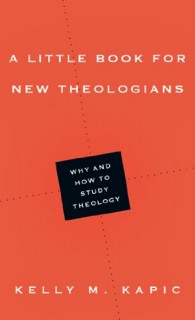On refusing to divorce theology from everyday life…

Theology, of late years, has been having what is known as ‘a bad press.’ We’re told that theology is dry and academic. People prefer spirituality to religion. Doctrine is dull. Or in the words of one prominent pastor, the need is for “deeds rather than creeds.”
Unfortunately, the debate about theology is not new. In the 1930s, the lay theologian Dorothy Sayers wrote, “Official Christianity, of late years, has been having what is known as ‘a bad press.’” She went on to argue that the problem with empty churches in England was not that preachers insisted on “too much doctrine.” Rather, “The fact is the precise opposite. It is the neglect of dogma that makes for dullness.”
From a different vantage point, Dr. Kelly Kapic has recently written a small but very important book to address some of the same issues that disturbed Dorothy Sayers. One of his concerns is what he calls “theological detachment,” the disconnect between theology and life. In A Little Book for New Theologians: Why and How to Study Theology, Kapic makes a persuasive case for rejecting any divorce of “theological considerations from practical human application.” By way of introduction, here are a couple excerpts from Chapter 4, “The Inseparability of Life and Theology.”
We often think that theology becomes defective because of faulty thinking. Not so…. Our theology can become corrupted because we neglect to attend to our lives, for true theology must always be true spirituality. … [C]ognitive reflection always occurs within the context of experience. The goal here is not perfection or some strange attempt at spirituality defined by ever-increasing attempts of self-improvement. A pious and holy person is not one who is free from the struggle with sin but one who freely soaks in the love of the Father and the grace of the Son and finds renewal in the strong fellowship of the Spirit. Simply talking about God does not making one pious.
Given the reciprocal relationship between theology and practice, it becomes imperative that theologians, whether armchair or professional, cultivate faithfulness. J. I. Packer has warned us, “If our theology does not quicken the conscience and soften the heart, it actually hardens both; if it does not encourage the commitment of faith, it reinforces the detachment of unbelief; if it fails to promote humility, it inevitably feeds pride.” Pride and arrogance, which often accompany theological discussion, are not simply the temptation of the domineering pastor or condescending professor; they are a temptation for all of us. When we speak of God, a strange enticement can occur. In subtle ways we begin to confuse ourselves with God. We think our words, our understanding, our convictions perfectly reflect God’s truth. In fact, we are not God, we have blind spots, we do not ever fully see how things work together. Marks of a corrupt theology include fits of anger, jealousy, division and strife (Gal. 5:19-21), where understanding has become an idol rather than an avenue to the living God. Genuine theology cultivates a spirituality of grace, humility, truth, gentleness, unity, peace, patience and love of God (Gal. 5: 22-26). To separate theology and spirituality is to misunderstand, and even damage, both.
What I’m advocating here is … a refusal to divorce theological considerations from practical human application, since theological reflections are always interwoven with anthropological [that is, human] concerns. …
Clearly our theology must be God-centered, but this language can mask the reality that our theology is, at the same time, concerned with our relation to this God. While other terms such as “pastoral” or “experiential” could be used, these terms often carry either unnecessarily negative connotations or represent a notion of what is done only after theological reflection, as though we work to get our theology correct and then move on to practical concerns.
Throughout A Little Book for Young Theologians, Dr. Kapic helps us to see that “The question is never if you’re a theologian, but whether or not you’re a good one.” More to the point, he sets before us a unified vision—the simultaneous making of good theologians and the making of good theology.
We enter this theological pilgrimage empowered by the Spirit of the living God and accompanied by the saints of the ages. Given our review of these issues of prolegomena (first things), I would like to conclude with a working definition of the task before us. In its most fundamental form, Christian theology is an active response to the revelation of God in Jesus Christ, whereby the believer, in the power of the Holy Spirit, subordinate to testimonies of the prophets and apostles as recorded in the Scriptures and in communion with the saints, wrestles with and rests in the mysteries of God, his work and his world. This is the way of our pilgrimage. The is the path of the living God.
Kelly M. Kapic is professor of theological studies at Covenant College in Lookout Mountain, Georgia. He earned a Ph.D. in systematic and historical theology at King’s College, University of London and an M.Div. at Reformed Theological Seminary. Dr. Kapic’s articles have been published in the International Journal of Systematic Theology and Westminster Theological Journal. He is the author, coauthor, or editor of several books, including a modern edition of John Owen’s Overcoming Sin and Temptation, co-edited with Justin Taylor.


 February 25, 2013
February 25, 2013 







Comments are closed.